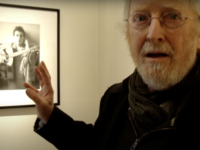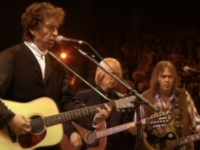With a scarifying Titanic narrative as its centerpiece, Tempest promised to be the ever-enigmatic, never-tiring Bob Dylan’s most somber, ruminative work yet. But it was different in the listening.
For all of the album’s off-handed menace, for its many betrayals, for all of its fiery condemnations, Tempest arrived in 2012 with commiserate moments of community, of gritty determination, of desire, of grace. Nobody ever got saved, or even forgiven, as far as I could tell. Yet there were tender mercies, things worth grabbing onto, fleeting pleasures for those who’d made it this far.
The music provided its own counterweight, too: “You’re like a time bomb in my heart,” Dylan sang in “Duquesne Whistle,” but that line (so filled with loneliness and chaos) found a home amid this lean, two-stepping Western swing. Ominous narratives like “Scarlet Town” and “Tin Angel” – the last about a fiery murder-suicide – arrived with all the free-wheeling attitude of a bluegrass picking session.
Elsewhere, light positively leaked out of “Soon After Midnight,” this alley-cat rockabilly ballad. Rather than settling into gathering shadows, however, Bob Dylan instead ran toward some unnamed salvation. “Long and Wasted Years,” with its waltzing sense of reverie, was even more emotionally raw: “I wear dark glasses to cover my eyes; there’s secrets in them I can’t disguise,” Dylan said, speaking so confidentially that it’s as if he was on somebody’s back stoop, having knocked on the door far too late.
Still, the heart of the record, its crepuscular center point, was still to come – like that shadowy iceberg of old.
Bob Dylan worked his way there via rumbling roots rockers like “Narrow Way,” with its sawing guitar counterpoint. At its most rambunctious, this track felt like an update of the dangerous folk-rock hybrid Dylan first unveiled on tour with the Band in the mid-1960s – and, in particular toward the end, Dylan sings with some of the same abandon, matching stride for stride the savagely insistent riff. “Early Roman Kings,” a blues-soaked parable about murderous thugs rising to the level of national despots, traded that guitar for David Hidalgo’s accordion – but the effect is no less malignantly dangerous.
There was often a loose improvisational feel, especially during moments like “Pay In Blood,” which settled into a shambling groove (almost like a country R&B) even as Bob Dylan rejoined his hard-bitten survivor’s tale: “How I made it back home, nobody knows – or how I survived so many blows. I’ve been to hell; what good did it do? You bastards! I’m supposed to respect you?”
Finally, it seemed, we came to “Tempest,” a remorseless 14-minute rumination on the Titanic’s desperate plunge into the icy black waters of the North Atlantic in 1912. The track, which quickly became one of Dylan’s most celebrated, unfolded with all of the specificity and dangerous proximity of an Irish murder ballad (“lights down the hallway, flickering dim and dull; dead bodies already floating in the double-bottomed hull”) even as Dylan underscored the broader human stories found embedded in every disaster: There are heroes, and sons of bitches; the unfairly doomed and the feckless ne’er-do-wells – all screaming toward the same awful fate, all swirling toward the sea bottom.
It’s a harrowing image, one of the absolute darkest and most completely sobering of Bob Dylan’s long and often brutally frank career.
The closing “Roll On John,” then, was an unexpected delight – and not just because it arrived so many decades after his friend Lennon was shot in the back multiple times by a deranged fan. Dylan showed, through the prism of a broken heart, how the living carry the memory of those who have gone. And also how, in some small way, it keeps these lost loved ones walking among us.
A small gift, to be sure, considering all that this world takes away. But, Bob Dylan – simultaneously occupying the role of leathered curmudgeon who’s seen it all, and tender-eyed romantic baring his chest – once more walked the fine line of contradiction, a place he has called home for so long that it ought to be re-christened in his honor.
And, wouldn’t you know it? Decades and decades later, he still never loses his balance.
- ‘Together Through Life’ Remains One of Bob Dylan’s Most Low Key, Organic LPs - April 15, 2024
- Why Joe Jackson’s Retro ‘Body and Soul’ Said So Much About His Future - March 14, 2024
- How Rudolph Stole the Show on ‘The Temptations Christmas Card’ - December 25, 2023




